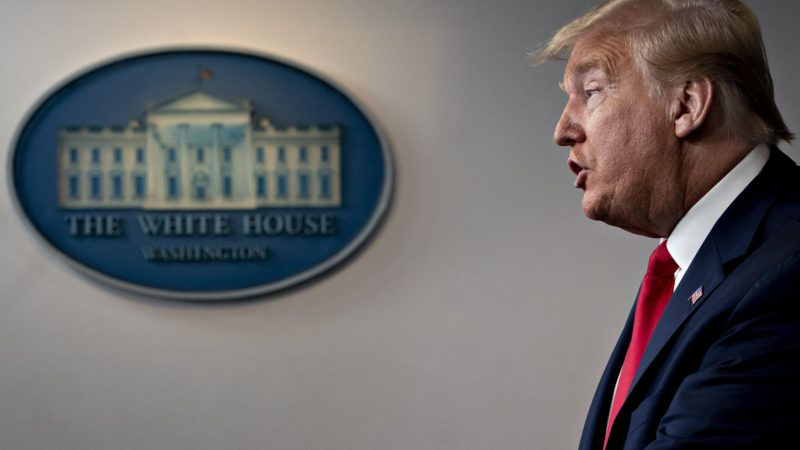Liberals Have Rediscovered the 10th Amendment's Value During the Coronavirus Pandemic
Will they keep it in mind even if Joe Biden becomes president?

Amid the grim coronavirus news of death and unemployment, at least there is the comic relief of the left embracing the Tenth Amendment.
Suddenly trendy is the provision of the Bill of Rights that "The powers not delegated to the United States by the Constitution, nor prohibited by it to the states, are reserved to the states respectively, or to the people."
The rush to the Tenth came in response to President Trump's statement on May 22. "I call upon governors to allow our churches and places of worship to open right now," Trump said. "The governors need to do the right thing and allow these very important, essential places of faith to open right now, for this weekend. If they don't do it, I will override the governors."
The editor of Mother Jones, a left leaning magazine, Clara Jeffrey, wasn't having it. "To be clear, Trump can't do [expletive] to force churches/temples/mosques to open. Little thing called the 10th Amendment," she tweeted.
The White House correspondent of the PBS Newshour, Yamiche Alcindor, made the same point. "Pres Trump says he will 'override the governors' if they don't follow new CDC guidance and open places of worship this weekend. Context: The 10th Amendment of the Constitution says powers not delegated to federal government are reserved to the states," Alcindor tweeted.
A Democratic congressman from California, Jared Huffman, and a Democratic congressman from Maryland, Jamie Raskin, issued a joint statement accusing Trump of "breathtaking arrogance," and of threatening "to trample the sovereign powers of the states under American federalism…and the rights of the people under the First Amendment and the Tenth Amendment."
Rachel Laser of Americans United for Separation of Church and State insisted that Trump lacks the power to override the governors. "The Tenth Amendment to the Constitution forbids the federal government from strongarming the states," Laser said, as quoted by Politico's Josh Gerstein.
What's amusing about this? Well, it's the humor of contrasting it with the attitude toward federal supremacy and states' rights that had obtained some years back, when the Democrats controlled the White House, and when "states rights" was the cry of segregationists, not social-distancers.
A front-page news article in The New York Times back in 2010, when President Obama, a Democrat, was in the White House, cast doubt on states' rights efforts.
"Article 6 of the Constitution says federal authority outranks state authority, and on that bedrock of federalist principle rests centuries of back and forth that states have mostly lost, notably the desegregation of schools in the 1950s and '60s," the Times reported then. The Times quoted a law professor, Ruthann Robson, who claimed, "Article 6 says that that federal law is supreme and that if there's a conflict, federal law prevails."
A different New York Times article from 2010 described the Tenth Amendment as "The Tea Party's favorite part of the Constitution," a reference to the grassroots "Taxed Enough Already" movement that was then organizing protests against Obama's policies.
And a third Times article from 2010, reporting on Elena Kagan's confirmation hearing, observed, "Tea Party supporters believe that much of what the federal government regulates should be left to the states, where voters hold a shorter leash. For this reason, they embrace a strict interpretation of the 10th Amendment, which says that the powers not delegated to the federal government by the Constitution 'are reserved to the states respectively, or to the people.'"
Back in 1996, when a different Democrat, Bill Clinton, controlled the White House, a Times editorial complained, "A headstrong five-justice majority is driving the Supreme Court toward a revolutionary, indeed reactionary, interpretation of federalism, tilting the balance dangerously toward states' rights at the expense of Federal power."
It's hard to avoid the conclusion that support for states' rights or federal power is dependent on whether your guy is the one in the White House giving the orders or the one in the governor's mansion being ordered around. It's less principled or consistent that it is partisan and situational.
The right can vacillate on these matters, too. That's particularly true in religious freedom cases. A strong historical legal case can be made that the First Amendment prohibition on establishing a religion was intended as a restriction on the federal government, not the states. So some conservatives have resisted using federal power to strike down, say, state school prayers or depictions of the Ten Commandments in state courthouses. But many of these same folks are glad Trump is encouraging governors to allow in-person worship, an expression of the free-exercise protection in the same First Amendment.
If the left presses the "state sovereignty" argument against Trump too far, it may find that clashes will be refereed in federal courts, and that Trump is commander-in-chief of a military with firepower that dwarfs any state police or National Guard unit. But Trump, too, may wish to recall a lesson of the Tea Party, which is that if voters are angry enough at Washington that they've discovered the often-obscure Tenth Amendment, there may be some price to be paid by incumbents in the upcoming election.
For skeptics of Washington-imposed central authority or big government, the left's embrace of the Tenth Amendment may be a positive effect of the pandemic. What are the chances that it would last into a Biden administration?


Show Comments (115)